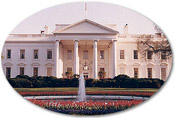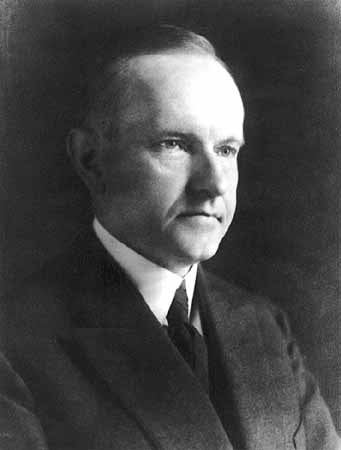

CALVIN COOLIDGE
Biography

For Americans, July 4 marks Independence Day. For John and Victoria Coolidge of Plymouth Notch, Vermont, July 4, 1872, also marked the birth of a son. Their son, whom they named John Calvin Coolidge, was to become the 30th President of the United States.
Early Political Career
Coolidge had shown some interest in politics at college, and he soon began to take an active part in Northampton politics. He worked hard for the Republican Party, and in 1898 he was elected to his first office—city councilman.
In 1906 Coolidge was elected to the Massachusetts House of Representatives. He was a conservative in politics and did not trust reformers. But he did vote for two reform resolutions that later became amendments to the United States Constitution. One resolution called for the direct election of United States senators by the people (senators were then elected by the state legislatures). The other gave women the right to vote.
After two terms in the legislature, Coolidge returned to Northampton, Massachusetts. In 1909 he was elected mayor. With his goal of thrifty government, Coolidge lowered taxes and reduced the city debt. At the same time he was able to raise the pay of many city employees.
While in Northampton, Coolidge met Grace Goodhue, a teacher at a school for the deaf. They were married in 1905 and had two sons. Mrs. Coolidge was gay and full of fun—just the opposite of her quiet, careful husband.
Governor of Massachusetts
In 1911 Coolidge returned to the legislature as a state senator. His re-election to a second and third term in the Senate made him an important figure in state politics. In 1915 he was elected lieutenant governor, and 3 years later he became governor of Massachusetts.
The Boston Police Strike
On September 9, 1919, most of the Boston police force went on strike for higher pay. For 2 days there was rioting and robbery in the city of Boston. Finally, in response to the mayor's call for help, Coolidge called out the National Guard, and order was restored. In reply to a plea for sympathy for the striking policemen, Coolidge issued his famous statement: “There is no right to strike against the public safety by anybody, anywhere, any time.” He became a national hero and a symbol of law and order.
In the 1920 Republican Party convention, Senator Warren G. Harding won the nomination as candidate for president. When one of the delegates suggested Coolidge's name for Vice-President, the cry of “We want Coolidge” rang out through the convention hall. Coolidge became the vice–presidential candidate, and in the election of 1920 Harding and Coolidge won an overwhelming victory.
President
On the morning of August 3, 1923, Vice-President Coolidge was in Plymouth, visiting his father, when the news of Harding's death reached him. Coolidge was now president of the United States. His father, a notary public, administered the oath of office to him.
Soon after Coolidge entered the White House, the scandals of Harding's administration came to public attention. The worst was the Teapot Dome oil scandal, which involved members of Harding's cabinet. Secretary of the Interior Albert B. Fall went to jail for his part in the affair, and Secretary of the Navy Edwin Denby was forced to resign. Attorney General Harry M. Daugherty was involved in another scandal and almost went to jail. Coolidge was never connected with the scandals, and his reputation helped to save the Republican Party from disgrace.
Coolidge was so popular that he had no trouble winning the election of 1924. His campaign slogan was “Keep Cool with Coolidge,” and he received almost twice as many popular votes as his Democratic opponent, John W. Davis.
The Roaring 20's
Calvin Coolidge was president during one of the most colorful periods in American history. The 1920's are often called the Roaring 20's and the Jazz Age. It was the era of Prohibition. The Volstead Act, the 18th amendment to the Constitution, had made the sale of alcoholic beverages illegal. But many people ignored this highly unpopular law and purchased liquor from “bootleggers” or in “speakeasies.” The most notorious of the bootleggers was a man who helped make the word “gangster” a part of the language—Al Capone.
But the 20's were more than an era of bootleg liquor and gangsters. The 19th amendment to the Constitution gave women throughout the United States the right to vote. Charles A. Lindbergh became the first man to fly nonstop and alone across the Atlantic Ocean. The first talking movie, “The Jazz Singer”, starring Al Jolson, was produced. It was a golden age of sports. Babe Ruth was hitting home runs, and Gene Tunney defeated Jack Dempsey for the heavyweight boxing championship of the world.
During the 1920's the population of the United States grew from less than 106,000,000 to almost 123,000,000. And for the first time in American history, more people lived in cities and towns than in rural areas. The country seemed prosperous, and everybody wanted to have a good time and not worry too much about tomorrow.
Coolidge's Popularity
Coolidge was popular because the people saw him as a symbol of the prosperous times. They also admired his old-fashioned virtues of thrift and common sense. As president he was conservative in his views on economics. He did not believe in government interference in private business. However, his support of a high protective tariff, or tax on goods imported into the United States, aided American business. With his respect for thrift, Coolidge worked to limit government spending, to reduce the national debt, and to lower taxes. But, though there was prosperity, not everybody shared in it. Many industrial workers were paid low wages, and farmers were hard hit by declining prices on their crops. A bill to raise the prices of farm products was vetoed by Coolidge.
Foreign Affairs
Coolidge took little interest in foreign affairs. He opposed the United States's joining the League of Nations, an organization similar to the United Nations. He did favor American membership in the World Court. But Congress’ insistence on certain conditions before approving membership, and Coolidge's lack of real enthusiasm kept the United States out of the Court. The Kellogg–Briand Pact, an American and French plan to outlaw war, met with more success. It was signed by the United States and 14 other nations in 1928.
Coolidge showed more concern about Latin American matters. Revolutions in Nicaragua prompted him to send 5,000 marines to that country to protect American lives and business interests. When relations between Mexico and the United States became strained in a dispute over oil lands, the president appointed Dwight W. Morrow ambassador to Mexico. Morrow succeeded in improving relations between the two countries.
Coolidge Leaves the White House
Many people thought that Coolidge would run again for president. He surprised the nation when he said: “I do not choose to run for president in 1928.” In the election of 1928, Herbert Hoover became president.
Some historians and economists have criticized Coolidge for a lack of forcefulness and political leadership. They say that his administration was partly responsible for the Great Depression that began in 1929, soon after President Hoover took office. However, during the 1920's most Americans supported Coolidge’s policies.
After Coolidge left the White House, he returned to quiet Northampton, where he spent the remaining years of his life. He wrote articles for a newspaper, giving his opinion on current events and politics, and he published his autobiography. On January 5, 1933, he died suddenly of a heart attack.
David M. Reimers
New York University







